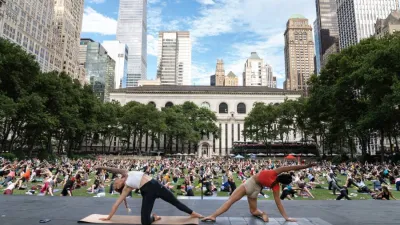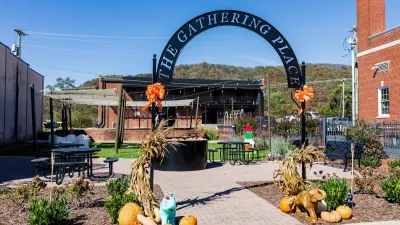According to Philip Myrick, communities that will fare the best economically are the ones that think locally and employ placemaking strategies.
"Placemaking is central to many of the powerful trends shaping the world today. The stumbling global economy, a vulnerable energy supply, and loss of confidence in far-flung markets are balanced by an upsurge of interest in things local: producing local food; promoting local businesses; preserving local character; protecting local open space and public places; finding meaningful ways to belong to a local community.
New economic theories point out that our city and regional economies may no longer function as they once did, but have been turned upside-down. This research suggests that human and creative capital of our communities are now the catalysts of economic growth rather than mere results of that growth.
According to Soji Adelaja, Director of the Land Policy Institute (LPI) at Michigan State University, keeping and attracting people is the most important strategy in this new economic landscape. Services, which are inherently local and include everything from doctors' visits to construction projects, now account for a larger share of the economy than goods. A Land Policy Institute study shows that half of total economic losses stemming from drops in population are caused by a loss of service jobs and income. That means when people move they take a piece of the economy with them."
FULL STORY: How Your Community Can Thrive-- Even in Tough Times

Trump Administration Could Effectively End Housing Voucher Program
Federal officials are eyeing major cuts to the Section 8 program that helps millions of low-income households pay rent.

Planetizen Federal Action Tracker
A weekly monitor of how Trump’s orders and actions are impacting planners and planning in America.

Ken Jennings Launches Transit Web Series
The Jeopardy champ wants you to ride public transit.

Rebuilding Smarter: How LA County Is Guiding Fire-Ravaged Communities Toward Resilience
Los Angeles County is leading a coordinated effort to help fire-impacted communities rebuild with resilience by providing recovery resources, promoting fire-wise design, and aligning reconstruction with broader sustainability and climate goals.

When Borders Blur: Regional Collaboration in Action
As regional challenges outgrow city boundaries, “When Borders Blur” explores how cross-jurisdictional collaboration can drive smarter, more resilient urban planning, sharing real-world lessons from thriving partnerships across North America.

Philadelphia Is Expanding its Network of Roundabouts
Roundabouts are widely shown to decrease traffic speed, reduce congestion, and improve efficiency.
Urban Design for Planners 1: Software Tools
This six-course series explores essential urban design concepts using open source software and equips planners with the tools they need to participate fully in the urban design process.
Planning for Universal Design
Learn the tools for implementing Universal Design in planning regulations.
Ada County Highway District
Clanton & Associates, Inc.
Jessamine County Fiscal Court
Institute for Housing and Urban Development Studies (IHS)
City of Grandview
Harvard GSD Executive Education
Toledo-Lucas County Plan Commissions
Salt Lake City
NYU Wagner Graduate School of Public Service





























